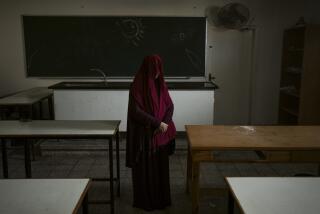Bosnian Government Hid POWs, Red Cross Says
- Share via
TUZLA, Bosnia-Herzegovina — In a clear violation of the U.S.-brokered peace agreement, the Muslim-led Bosnian government has been hiding 88 Serbian prisoners from international authorities and refusing to release them, the International Committee of the Red Cross reported Friday.
News of the noncompliance came as Secretary of State Warren Christopher traveled to Bosnia-Herzegovina to urge the former warring factions here to abide by the accord forged in Dayton, Ohio, late last year. The three sides’ failure to release all prisoners remains the most blatant violation of the agreement, under which prisoners were to be freed by Jan 19.
The 88 prisoners discovered by the Red Cross are being held at the main jail in Tuzla, the industrial city in northeastern Bosnia that serves as headquarters for U.S. troops participating in the NATO-led peacekeeping effort in the Balkans.
Bosnian Serb leaders have accused their adversaries of concealing prisoners in the Tuzla jail, but the government denied the accusations and in turn accused the Serbs of hiding prisoners.
“It is the responsibility of all the parties to release all the prisoners they have,” said Laurent Fellay, head of the Tuzla branch of the Red Cross, whose officials found the prisoners Friday. But Fellay said he did not have a commitment from the Bosnian government to release the prisoners.
The peace pact guarantees the Red Cross access to all detention sites so it can register prisoners and monitor their release.
Red Cross officials said they had suspected the prisoners’ existence in Tuzla because they had been prevented from visiting sections of the city’s jail since September.
After trying for months to gain permission to interview any undocumented prisoners there, Red Cross representatives were permitted access Friday to the three-story jail rising behind a 12-foot wall downtown.
*
The Red Cross has a policy of not reporting the living conditions of prisoners they visit. But a representative of the Bosnian government army who is familiar with the Tuzla jail said that eight to 12 of the Serbs live in each cell, sleeping on three-level bunk beds. At the beginning of the war the prisoners were beaten, but more recently the only force used against them was psychological, said the representative, who spoke on the condition of anonymity.
Hundreds of prisoners have been set free by all three sides--Muslims, Croats and Serbs--over the last several days, but the former warring factions still hold a combined 179 prisoners, according to the Red Cross.
Red Cross officials in Sarajevo, the Bosnian capital, said the Serbian side continues to hold 26 prisoners, 21 of whom should have already been freed and five of whom are being held in accordance with the Dayton agreement pending investigation of their alleged participation in war crimes.
In addition to the 88 discovered Friday, the Bosnian government holds 14 prisoners, nine of whom are the subjects of war-crimes investigations.
The Croatian side holds 51 prisoners. All but one are suspected of war crimes.
*
The Bosnian government has long charged that the Serbs hold hundreds of undocumented Muslim prisoners. They have expressed particular concern about thousands of men and boys missing since the fall last summer of Srebrenica, a Muslim enclave designated a “safe area” by the United Nations.
One place where Bosnian government officials suspect the Serbs are still holding Muslims is an old shopping mall in Srebrenica. But Red Cross authorities said they cannot verify the existence of any undocumented prisoners.
“We are following up on all allegations that we’ve received,” said Anne Sophie Bonefeld, a Red Cross spokeswoman in Sarajevo. “We went to Srebrenica today [Friday], and we didn’t find anything.”
All week long, women from Srebrenica have been demonstrating in Tuzla, demanding information on the whereabouts of thousands of men and boys missing from that city since July, when it was overrun by Bosnian Serb forces. The Serbs are suspected of committing a massacre there.
On Friday, a group of about 50 female refugees from Srebrenica met with President Alija Izetbegovic in Sarajevo to press their demands for information on their male relatives.
“We are asking Mr. Izetbegovic to influence the international community to do their job more efficiently and correctly,” said one of the women, Fatima Husenovic.
Izetbegovic is scheduled to meet with Christopher during his brief visit today. Although U.S. officials have said they are largely satisfied with the factions’ compliance with the military aspects of the agreement, U.S. officials have expressed disappointment that not all prisoners have been freed.
The primary purpose of Christopher’s visit is to press Serbian, Muslim and Croatian leaders to abide by the civilian aspects of the agreement--cooperating with war-crimes investigations, releasing captives and holding free and fair elections.
Meanwhile, Bosnian Serb television had some bitter words Friday for the NATO-led force, which shot dead a suspected sniper in the Serb-held Sarajevo suburb of Ilidza on Thursday.
“It was coldblooded murder,” said a commentator, identifying the dead man as 40-year-old Mirko Krestalica, a guard in the factory where he was shot. “This will remain like a black spot in the file of [the peacekeeping force.] It shouldn’t happen again.”
North Atlantic Treaty Organization spokesmen said the man was shot by French Special Forces in the aftermath of several sniping incidents against NATO troops in the Ilidza area. The spokesmen said the dead man was in violation of the peace accord by carrying a weapon in the demilitarized buffer zone.
Times staff writer Tracy Wilkinson in Sarajevo contributed to this report.
More to Read
Sign up for Essential California
The most important California stories and recommendations in your inbox every morning.
You may occasionally receive promotional content from the Los Angeles Times.












